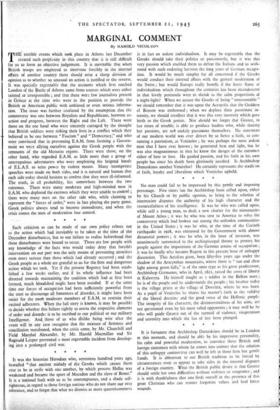MARGINAL COMMENT
By HAROLD. NICOLSON
THE terrible events which took place in Athens last December created such perplexity in this country that it is still difficult for us to form an objective judgement. It is inevitable that when British troops are employed to intervene forcibly in the internal affairs of another country there should arise a sharp division of opinion as to whether so unusual an action is justified or the reverse. It was specially regrettable that the accounts which first reached London of the Battle of Athens came from sources which were either tainted or irresponsible ; and that there were few journalists present in 6reece at the time who were in the position to provide the British or AMerican public with unbiased or even serious informa- tion. The issue was further confused by the assumption that the controversy was one between Royalists and Republicans, between re- action and progress, between the Right and the Left. There were those on the one hand who were sincerely outraged by the thought that British soldiers were risking their lives in a conflict which they believed to be one between " Fascism " and " Democracy," and who were convinced that in preventing E.A.M. from forming a Govern- ment we were allying ourselves against the Greek people with the remnants of the old Metaxist regime. There were those, on the other hand, who regarded E.A.M. as little more than a group of unscrupulous adventurers who were employing the brigand bands of E.L.A.S. to seize power by violent means. Many intemperate speeches were made on both sides, and it is natural and human that each side today should hesitate to confess that they were ill-informed. The truth, in all probability, lies somewhere between the two extremes. There were many moderate and high-minded men in E.A.M. who deplored the excesses which they were unable to control ; there were many men on the other side who, while claiming to represent the " forces of order," were in fact playing the party game. Greek politics always tend to become immoderate, and when the crisis comesthe men of moderation lose control.
* * * *






















 Previous page
Previous page